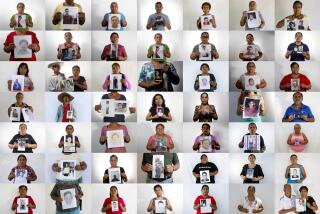Relatives of Missing Stuck in a Bureaucratic Maze
- Share via
The still uncertain fate of the thousands missing in the World Trade Center has created a quagmire of problems for families trying to collect on insurance policies, access bank accounts and execute wills.
The problem is simple: Coroners need physical proof--whether a piece of hair or an entire body--to prove that a person is deceased before they can issue a death certificate. However, in the case of last week’s tragedy in New York, many victims are believed to have vanished without a trace.
Such practices are typical in smaller-scale tragedies, such as airplane crashes or boats that sink. But the scale of the trade center tragedy is so immense--with 6,333 now declared missing in New York--that legal experts insist that established laws are inadequate to handle the situation.
Funeral officials say the problem is already affecting some of their clients, such as New York resident Karen Martinez.
Her husband was delivering flowers to an office in the north tower of the trade center when the airplane hit the building. She hasn’t heard from him since.
She also hasn’t been able to access the money he kept in a savings account for emergencies. “I didn’t think that I’d need to have my name on the account,” Martinez said. “He handled all of our bills.”
Officials with the Frank E. Campbell Mortuary in Manhattan say they ran into the problem earlier this week, when they were retained by a New Mexico family of a flight attendant who was on one of the planes that crashed into the towers.
“They keep asking us when the death certificate will be issued, and I can’t provide an answer for them yet,” said Kevin Mack, Campbell’s general manager. “All I know is that a person has to be missing for a certain period of time. But is that time three years? Two years? Six months? No one knows, and the government’s not telling us.”
Under New York law, a missing person can’t legally be declared dead until he or she has been “absent” for three years. The statute makes allowances, however, if there is “clear and convincing evidence” of “effective exposure to a specific peril.”
New Jersey state officials already have contacted New York’s Surrogate’s Court--which handles probate issues--and the New York State Supreme Court (the lowest court of jurisdiction for lower Manhattan) to relax the three-year rule.
“It’s an issue we’re sensitive to and will address it with the governor’s office and the city when appropriate,” said a spokesman with the New York Supreme Court.
Such rules are put into place to prevent fraud, insurance experts say.
The vast majority of claims stemming from disasters are legitimate. But attorneys for the insurance industry and plaintiffs say numerous air crashes--such as the Alaska Airlines crash off California last year--have produced questionable lawsuits, either from people claiming to be relatives of victims, or claiming injury damages.
This is of little consolation to the families of victims of the attacks on the World Trade Center, many of whom face rapidly escalating bills. Paperwork snafus have added an extra layer of pain to families already grappling with emotional and financial distress, critics contend.
“They’re either going to have to waive the laws, or get the governor to say they’re not going to be required,” said Bob Achermann, executive director of the California Funeral Directors Assn. “This could take months.”
Legal experts predict that the courts in New York will make a decision, and name a judge to handle these cases, sometime in the next few weeks or months. Survivors could then testify and show evidence that their loved ones went to work in the towers and didn’t come home. For those who didn’t work in the towers, the same procedure would be followed, said David R. Okrent, a New York lawyer specializing in estate planning.
Some insurance companies say that they will not wait for the government to make its decisions, and that they are taking the matter into their own hands. The Liberty Mutual Group said Thursday that it will not hold up benefits for families who don’t have the paperwork.
Instead, the company will ask for proof of a family link, such as a valid marriage or birth certificate.
More to Read
Sign up for Essential California
The most important California stories and recommendations in your inbox every morning.
You may occasionally receive promotional content from the Los Angeles Times.













